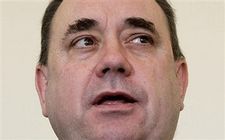 Ten years ago, when I was doing my tour of duty as a reporter in the Scottish Parliament, I had a talk with an SNP figure, who shall remain nameless, about their grand plan. Scotland was to be a nation, and that means its politicians perform in certain ways. They wanted to look like statesman, with a state. Their opportunity lay in crisis. “So when there is a disaster overseas, we will have Scottish aid leaving a Scottish airport,” he said. “When a Scot dies overseas, we have the Scottish First Minister sending condolences.” He didn’t say that, when a Libyian murderer wants to be released, the SNP can use this to thumb their nose at Wicked America and posture on the world stage. Any excuse to make Scotland seem distinct from England, and themselves as spokesmen for a country.
Ten years ago, when I was doing my tour of duty as a reporter in the Scottish Parliament, I had a talk with an SNP figure, who shall remain nameless, about their grand plan. Scotland was to be a nation, and that means its politicians perform in certain ways. They wanted to look like statesman, with a state. Their opportunity lay in crisis. “So when there is a disaster overseas, we will have Scottish aid leaving a Scottish airport,” he said. “When a Scot dies overseas, we have the Scottish First Minister sending condolences.” He didn’t say that, when a Libyian murderer wants to be released, the SNP can use this to thumb their nose at Wicked America and posture on the world stage. Any excuse to make Scotland seem distinct from England, and themselves as spokesmen for a country.
That conversation came in my first few weeks as a political reporter, and I wondered at the time how you would train yourself to see political opportunity in times of crisis. But as I went on to see, many politicians are defined by how they respond to it: Giuliani to 9/11, Blair to Diana, David Davis to the 7/7 bombing. But it means that, when there is a tragedy, the minds of politicians turn to asking: how can I maximise this moment of drama?
I will give Alex Salmond the benefit of the doubt, and assume that no such thought crossed his mind when he released a statement about the death of Linda Norgrove, who died during an attempt to release her from captivity. David Cameron and William Hague made short, dignified statements. But I cannot see why Salmond needs to release a statement about a woman who has not really lived in Scotland since she left Aberdeen University. As First Minister, Salmond is in charge of about half of government spending in Scotland – and as a unionist, I’d like him to confine his comments to the provision of public services.
But devolution hasn’t quite worked out that way. What was supposed to “kill the SNP stone dead” (as George Robertson said) has grown – as the SNP thought it would – by sheer force of political vanity. The late Donald Dewar was a humble and much-loved man, but his successors – Henry McLeish and Jack McConnell – had all the vanity that the SNP could want. It was under Labour that Scottish “embassies” were opened in China and Washington. Ten years ago, there was uproar when McLeish called his administration a “government”. (“They can call themselves the White Heather Club if they like” fumed one Labour minister in Westminster, “but they’ll never be a government”). Now, the misleading phrase “Scottish government” is routinely used to describe Salmond’s administration. I’d prefer a period of silence on Salmond’s part today, but expectations have shifted. The Scottish media will look to the First Minister to give comments on the death of a Scot, as if he were spokesman for a nation.
No one will be outraged, or surprised, that Salmond has made such a comment today. Things have developed now to the extent that he’s expected to – and, of course, Salmond speaks well. Far better than McLeish or McConnell attempted to do for Scotland (or Brown did for Britain). And it is perhaps the fact that his intervention is so unremarkable that brought home to me how far devolution has gone. And in a direction unionists would not welcome.”
PS: I doubt tomorrow’s newspapers will say much about what Norgrove was doing in Afghanistan – a shame because the US-led project she was involved in was a rare example of a civilian aid programme that worked. This piece, in May from the Philadelphia Inquirer, gives a good summary.







Comments